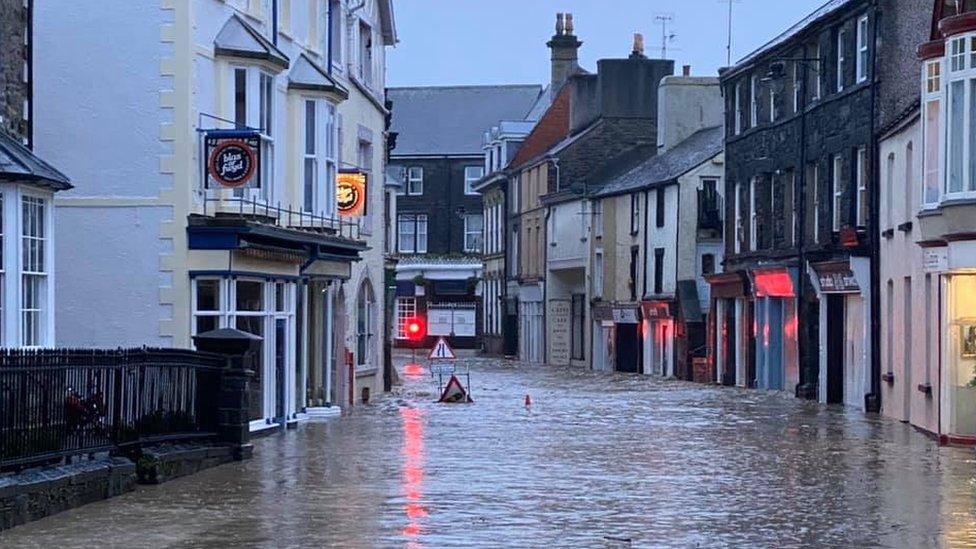Climate change: Why weather changes worry Wales' 'wettest town'
- Published
Blaenau Ffestiniog: What is Wales' wettest town like?
Appropriately enough, it's drizzling on the day we visit the town billed as Wales' wettest.
A grey sky blends in with the towering slate mounds which surround Blaenau Ffestiniog, whose quarries once "roofed the world" and helped it earn Unesco World Heritage status.
Situated among mountains in the heart of Snowdonia, the area's reputation as one of the wettest places in the UK is also considered a badge of honour.
Residents even hosted a Festival of Rain, external for a few years.
They are now being asked to work together to decide on ways of adapting to the challenges posed by climate change.
In the largest project of its kind so far in Wales, five climate assemblies are being set up across Gwynedd in north-west Wales to involve local communities in the push towards a greener future.
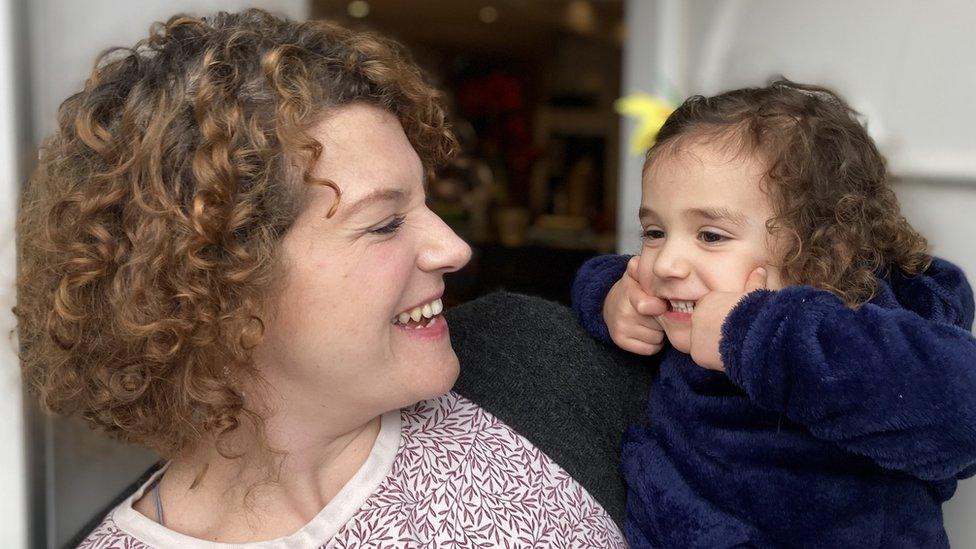
Amy and daughter Anri wants to help grow more fruit and veg in their community
One of the first to sign up during a door-knocking recruitment drive was Amy Karamian, holding her young daughter Anri.
'Storms, drought and rain affect crops'
She runs a vegetable box delivery scheme and said climate change was a pressing concern for someone working with farmers.
"It's just constant seasonal updates from growers who are being affected by storms, drought, rain - a kind of constant cascade affecting the crops," Amy said on her doorstep.
She feels it is important for the community to look at providing more growing space and teach people the skills to cultivate their own fruit and vegetables in case access to food becomes "more and more limited" long term.
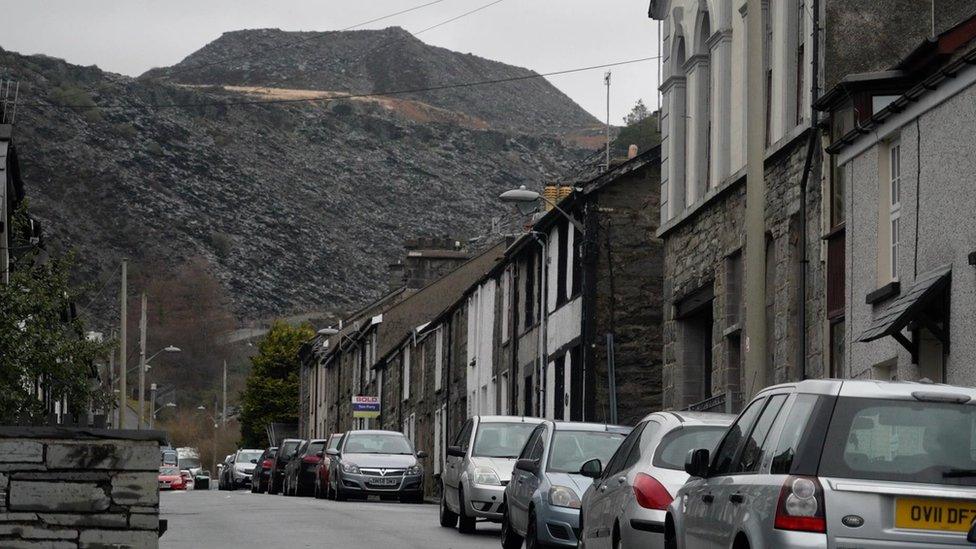
Damp and poor insulation are particular problems to some houses in Blaenau Ffestiniog
As Amy talked, builders were at work on a house nearby which had its roof blown off by Storm Eunice, one of three to hit the UK in quick succession in February.
'Difficult to keep houses both warm and dry'
The impact of wetter, wilder weather on the town's ageing, stone-built housing stock is something that worries community councillor Rory Francis.
"We have (among) the highest rainfall levels of any town in Wales and England so it's difficult to keep houses both warm and dry," he said, with damp and poor insulation particular problems.
But Rory said it is worth remembering how fortunate residents are to have such a beautiful local environment - "during lockdowns I could be out walking in the countryside, through tree-clad gorges every day - while my son was stuck in a tiny flat (in the city)".
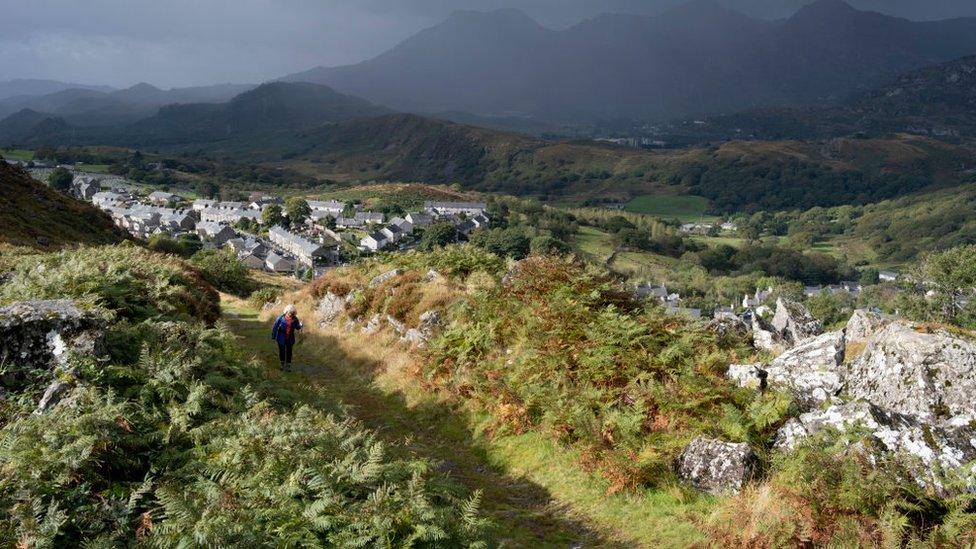
Blaenau Ffestiniog is surrounded by some stunning scenery in Snowdonia National Park
He said the town council had recently declared a climate and nature emergency, and had "high hopes" the new climate assembly would help them develop environmental policies.
'Better public transport needed'
Luke Mason joined a number of young people to sign up as organisers recruited people along the high street as the 19 year old said it is "worrying how much change is happening to our planet - it's on a massive scale".
He would like to see better public transport to encourage people out of their cars because his hometown "is a bit isolated if you don't drive".
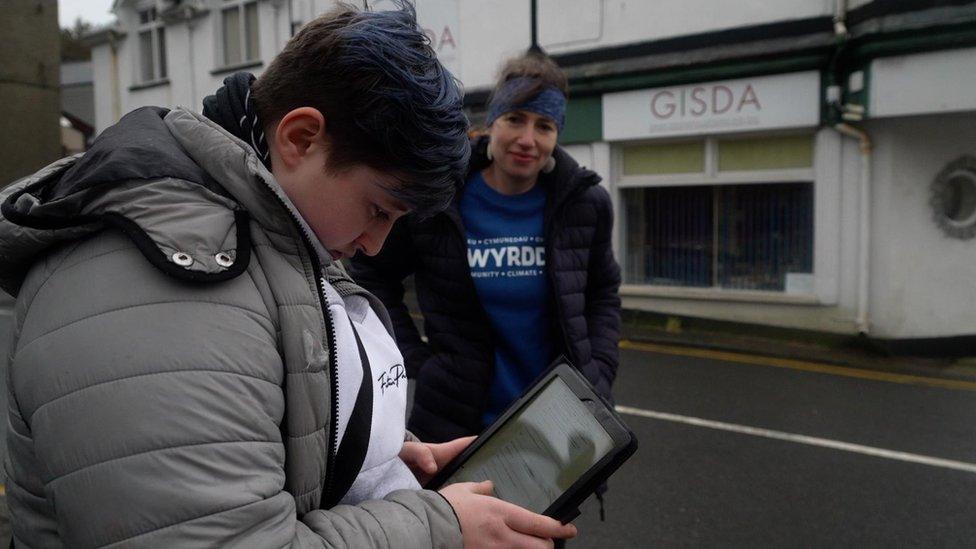
Sophie Lewis was quick to sign up to the Blaenau Ffestiniog climate assembly
Sophie Lewis was another 19 year old to sign up as she would like to see more parks created and activities for teenagers.
The apprentice chef also hoped there would be a focus on helping people with the cost of living - "electricity and gas are going really high, it's getting hard to pay my rent".
It was a point we heard repeatedly outside the offices of Cwmni Cymunedol Bro Ffestiniog, which brings together a number of social enterprises.
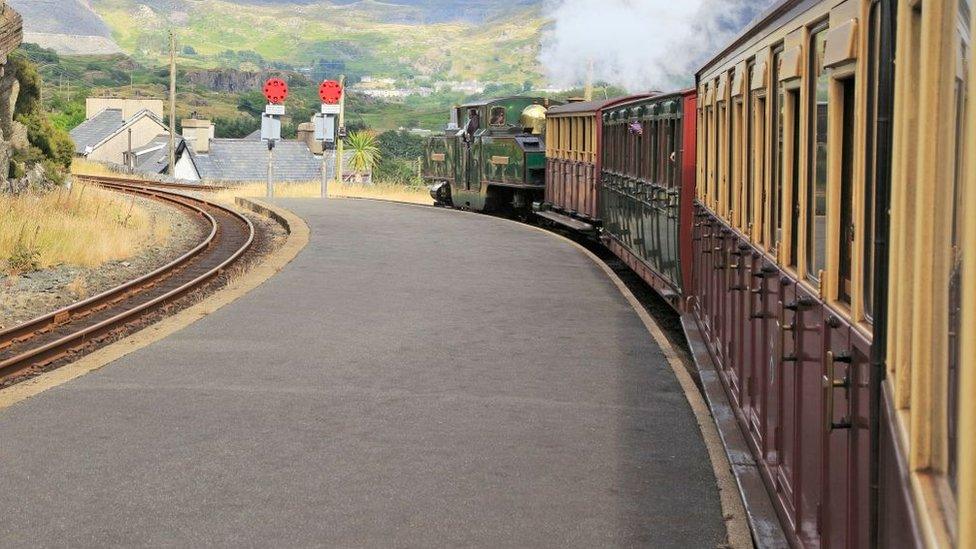
The Ffestiniog Railway which terminates at Blaenau Ffestiniog is the oldest independent railway company in the world
"We call it a parasol, rather than an umbrella, organisation, because it's always so sunny here," joked development officer Ceri Cunnington.
One of the projects offers a drop in service for people needing advice with issues such as saving energy and finding work.
'Coming together we can sort these issues'
Ceri said he's just been talking to somebody in tears as their monthly gas bill is set to rise from around £60 to over £200 in April.
"How are people meant to live like that?" he asked.

More on the cost of living:
EXPLAINED: Why are energy bills so high?

He sees the climate assembly idea as a way of trying to bring about social justice in a place which suffers from some of the highest levels of fuel poverty in Wales and yet has huge potential for generating green energy.
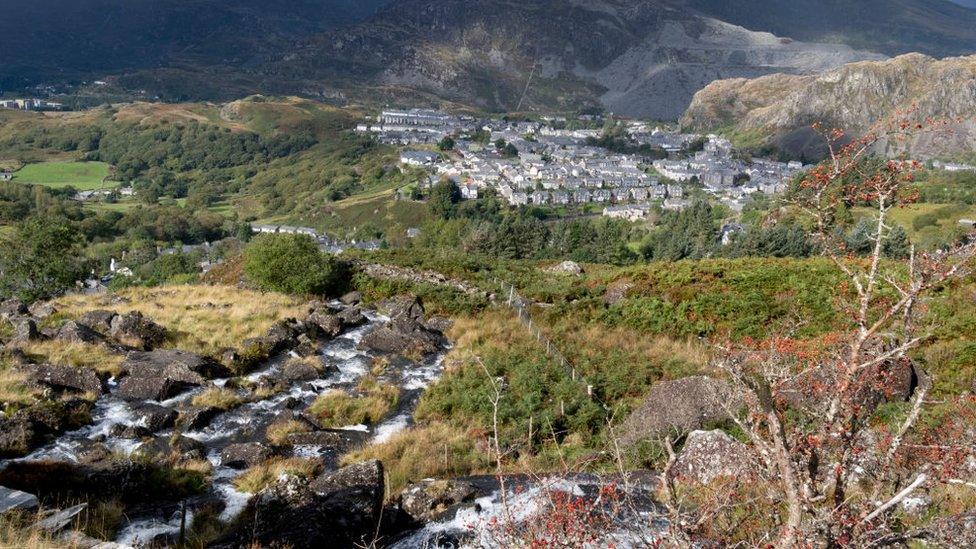
Water flows from the hills above Blaenau Ffestiniog
"Water comes flowing down the mountains and hydro power plants in this area create 133% of our electricity needs," he claimed.
"All of that resource is being sucked away. It's a scandal. But coming together with a collective voice we can get to grips with some of these issues."
How will the climate assembly work?
Traditionally, climate assemblies have tended to result in a report or recommendations for politicians or the government but organisers want to focus on actions the community could take themselves.
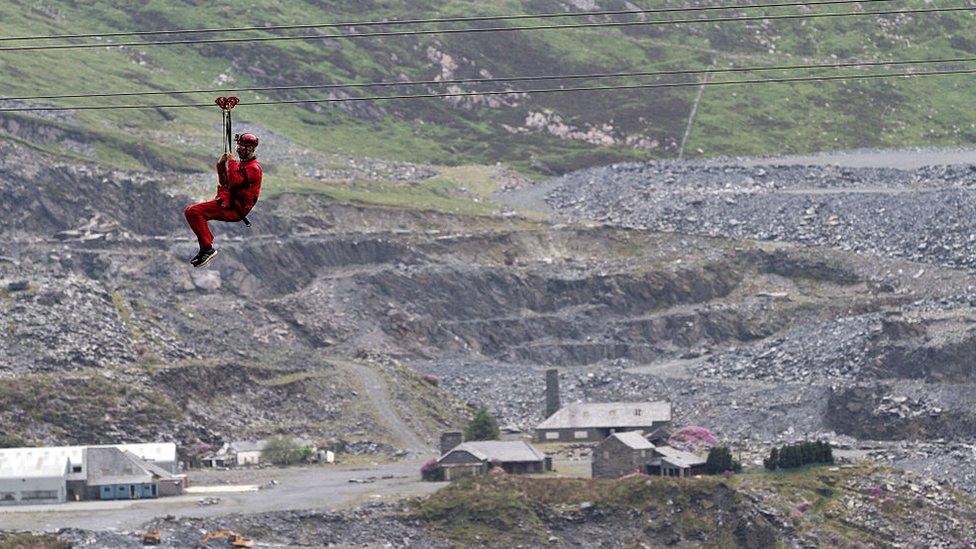
Blaenau Ffestiniog has evolved from slate mining town to tourist destination
That could involve coming up with ideas and then applying for grant funding to carry them out.
"The assemblies are for everybody, you don't need to know anything about climate change, you can have any sorts of opinions and ideas," explained Nina Bentley of Gwyrddni, the lottery-funded organisation set up to run the project across Gwynedd.
There has already been a UK assembly, as well as for Scotland and at local levels elsewhere in Wales.
One leading academic who has been involved in evaluating the work of other climate assemblies said they were "still an ongoing experiment in how to involve people in decision making" around climate change.
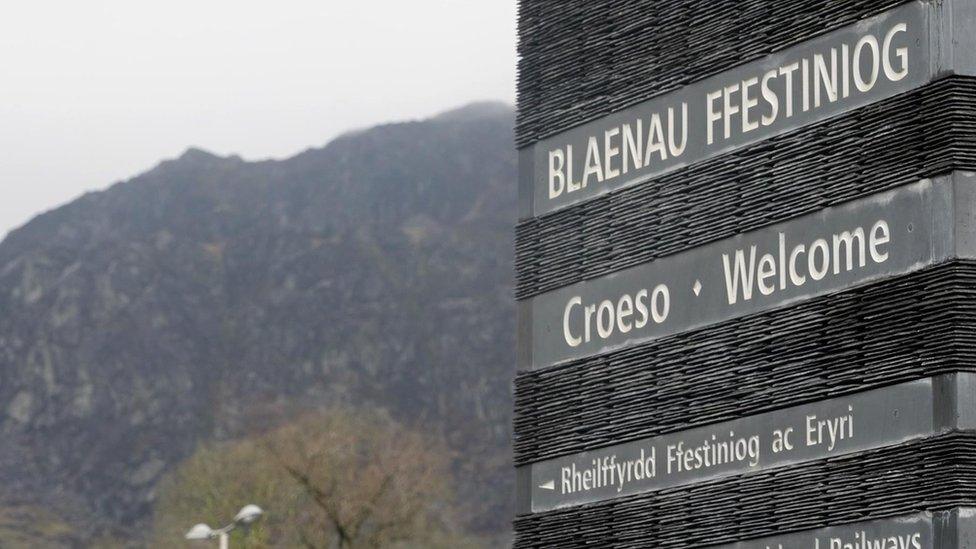
More than 12,000 people lived in Blaenau Ffestiniog at the height of the slate industry, now it's home to about 4,000 people
But Dr Stuart Capstick, deputy director of the centre for climate change and social transformations at Cardiff University, said that participants tended to feel "positive about them and quite galvanised afterwards".
"They go from being a bit curious through to becoming informed and quite active and outspoken as a result," he said.
"We know from our own research that the public is broadly speaking very concerned about climate change but often at a bit of a loss about where they fit in.
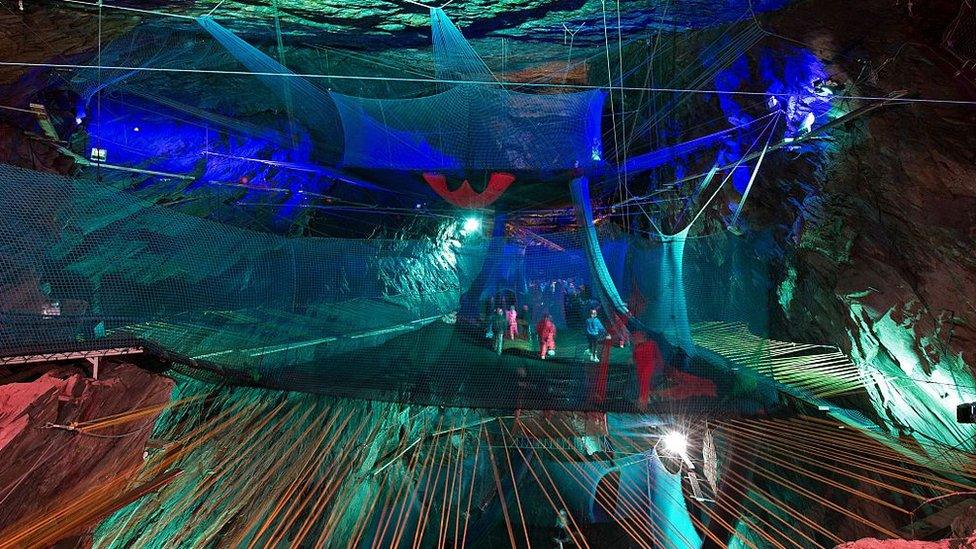
People can jump on a network of giant trampolines at an old disused slate mine near Blaenau Ffestiniog
"Often it is presented as either this huge, vast complex international issue or it gets reduced to individual actions.
"So the value of these types of processes is they help to bridge that gap and give some context at a local level as to the type of policy measures or local actions that can be taken."
Back in Blaenau Ffestiniog, Ceri Cunnington is aware of the dangers this could descend into a talking shop.
"It's when you get higher up it's a talking shop," he said with a wry smile.
"Wales is brilliant at writing strategies, probably the best in the world. But acting on them is something completely different, and that's where community comes in.
"Community does respond, does work together and can come up with solutions, and we found that out during Covid."
Flooding in the Blaenau Ffestiniog rail tunnel, which was built almost a century-and-a-half ago, is on the increase.
As well as the Blaenau Ffestiniog area assembly, others are being set up for Pen Llŷn, Dyffryn Ogwen, Dyffryn Nantlle and Dyffryn Peris over the next two years.
Residents have until 4 April to sign up either in person or online before a representative panel of 50 people will be selected to take part in each area.
Related topics
- Published14 November 2021
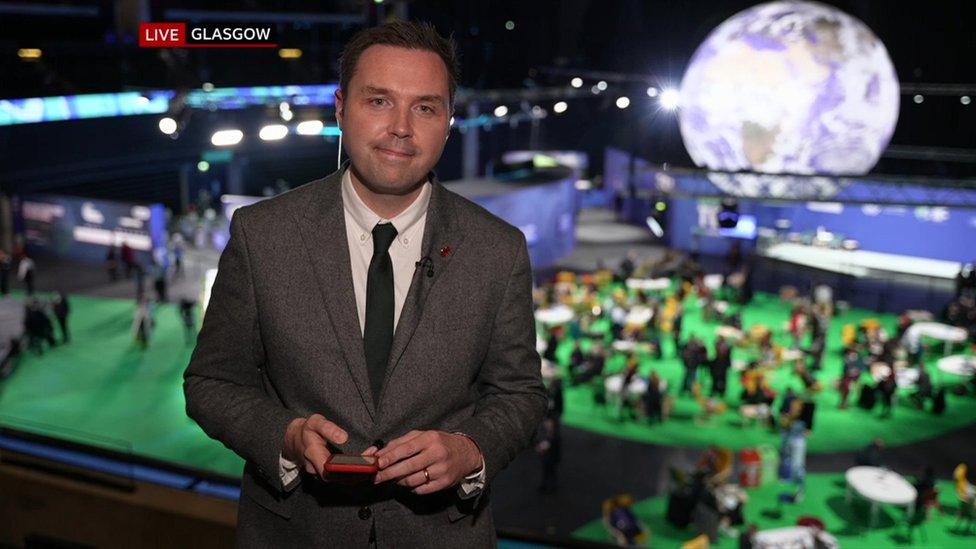
- Published31 October 2021
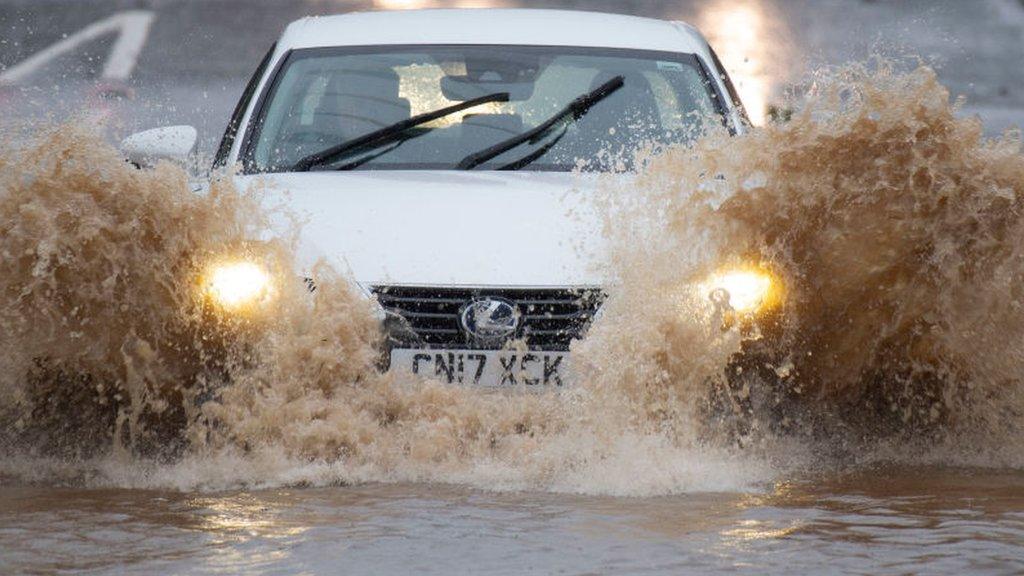
- Published28 September 2021
